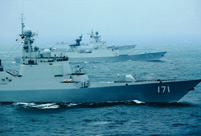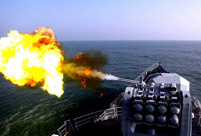

It appears Midea has done its math. It is a trait not uncommon among Chinese companies shopping for overseas brands, businesses and properties.
For instance, earlier this month, an investment company Australian Rural Capital informed the stock exchange concerned that it is partnering with China's Shanghai Pengxin Group to buy S. Kidman &Co.
Kidman is Australia's largest private landholder with properties covering 101,000 square kilometers in Western Australia, South Australia, the Northern Territory and Queensland. And in January, China's Haier agreed to buy US General Electric's home appliances business for $5.4 billion in cash.
Chinese aviation and shipping conglomerate HNA Group has plans to buy Ingram Micro Inc, which distributes products ranging from Apple Inc's iPhones to Cisco's network equipment, for about $6 billion.
Evidently, overseas M&A deals abound, so much so that the Ministry of Commerce spokesman Shen Danyang informed media recently that net capital flows have reversed. Since 2014, more capital has gone out of China chasing foreign assets than has come in.
"The trend will continue," he said. This year, Chinese investment overseas will likely exceed that of foreign investment in China.
Lu Jinyong, a professor at the University of International Business and Economics, Beijing, said last year the Chinese mainland's investment overseas ranked third at $130 billion, behind Hong Kong's $165 billion and the United States' $384 billion.
According to The Boston Consulting Group's September 2015 report "Gearing Up for the New Era of China's Outbound M&A", the motivations for such deals are changing.
Only 20 percent of such deals made during the last five years had the goal of acquiring strategic resources. About 75 percent were aimed at accessing technology, brand and market share.
However, the report showed that challenges follow M&A deals. For example, in 2014, Chinese companies signed 154 outbound M&A deals valued at $26.1 billion. But only 67 percent of them were eventually completed. This rate is much lower than that of European, Japanese and US companies involved in similar M&A deals.
BCG's report said flawed, unclear M&A strategies and ineffective deal management have caused many outbound M&A deals of Chinese companies to fail. "Good deals require clear strategy, effective implementation and relevant capabilities," said the report.
 |
 Train rides through blossoms
Train rides through blossoms HD pictures of battleships of PLA Navy
HD pictures of battleships of PLA Navy East Sea Fleet conducts combat drills
East Sea Fleet conducts combat drills Sophie Marceau goes square dancing in Guangzhou
Sophie Marceau goes square dancing in Guangzhou Police officers learn Wing Chun in E. China
Police officers learn Wing Chun in E. China Charming models compete in super model contest in Beijing
Charming models compete in super model contest in Beijing Thai most beautiful transgender Nong Poy release new photos
Thai most beautiful transgender Nong Poy release new photos Now and then photos of Shanghai Jiaotong University
Now and then photos of Shanghai Jiaotong University Is this what air travel will look like in 2050?
Is this what air travel will look like in 2050? Top 20 hottest women in the world in 2014
Top 20 hottest women in the world in 2014 Top 10 hardest languages to learn
Top 10 hardest languages to learn 10 Chinese female stars with most beautiful faces
10 Chinese female stars with most beautiful faces China’s Top 10 Unique Bridges, Highways and Roads
China’s Top 10 Unique Bridges, Highways and Roads Two Czechs describe how their love of China has lasted decades
Two Czechs describe how their love of China has lasted decades  Su Bin deserves respect whether guilty or innocent
Su Bin deserves respect whether guilty or innocent  US and China cooperate on largest nuclear security center in Asia-Pacific
US and China cooperate on largest nuclear security center in Asia-Pacific  Longer hours, differences in office culture and time zones trigger burnout among foreigners working in China
Longer hours, differences in office culture and time zones trigger burnout among foreigners working in China Day|Week